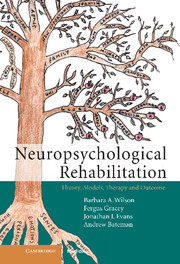Preface
Published online by Cambridge University Press: 03 March 2010
Summary
Neuropsychological rehabilitation is concerned with enabling people with cognitive, emotional or behavioural deficits to achieve their maximum potential in the domains of psychological, social, leisure, vocational or everyday functioning. In this book we address current rehabilitation practice as followed by those who believe that a holistic approach to rehabilitation is most effective. We define the holistic approach to rehabilitation as one that recognizes the fact that cognition, emotion and behaviour are dynamically interlinked. Consequently all these functions need to be addressed in an integrated way in brain injury rehabilitation by an interdisciplinary team.
We firmly believe that rehabilitation needs a broad theoretical base incorporating frameworks, theories and models from many different areas. Being constrained by one theoretical model can lead to poor clinical practice. We discuss the major theoretical approaches to rehabilitation, and the main changes in rehabilitation over the past 20 years. The major purpose of the book, however, is to present practical approaches to helping people with brain injury achieve those goals most valued by them and their families.
There are four sections to the book:
First, we review the background and guiding principles of neuropsychological rehabilitation. This includes an outline of the holistic programme of the Oliver Zangwill Centre for Neuropsychological Rehabilitation in Ely, Cambridgeshire, United Kingdom.
- Type
- Chapter
- Information
- Neuropsychological RehabilitationTheory, Models, Therapy and Outcome, pp. xi - xiiPublisher: Cambridge University PressPrint publication year: 2009
- 1
- Cited by



